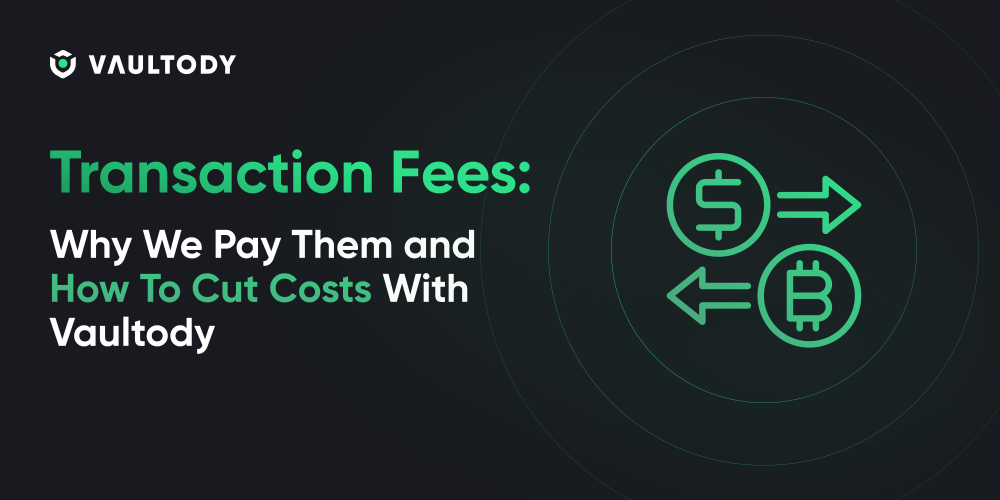In the realm of blockchain and cryptocurrency, transaction fees refer to the fees users must pay to the specific cryptocurrency's blockchain network. These fees encompass the costs associated with processing and confirming a transaction, which occurs on decentralized networks of nodes (computers) responsible for validating and recording transactions. With each blockchain different mechanisms for processing transaction fees exist.
Regarding the validation and processing of transactions, it's important to consider the contribution of crypto miners. Crypto mining is the process of creating new coins like Bitcoin in addition to validating new transactions. This task is accomplished by harnessing computational power, a task carried out by crypto miners. To put it simply, crypto miners utilize their resources to either generate new coins or verify pending transactions. The role they play is essential in upholding the network's integrity and security, however it is important to note that crypto miners input and functions can vary from one blockchain to another.
Calculating transaction fees
Calculating transaction fees can be challenging due to various decentralized blockchain factors. Each blockchain has its unique fee structure and transaction processing methods. One key factor is transaction size, measured in bytes. Larger transactions occupy more block space and result in higher fees.
On networks like Ethereum, deploying smart contracts or conducting token transactions increases transaction size and, consequently, fees. Network congestion is another influential factor. High transaction volumes can lead to increased fees, slower transaction times, and a degraded user experience.
Every blockchain establishes a base fee, periodically adjusted. During network congestion or for urgent transactions, users can prioritize their transactions by paying an additional fee. For instance, on blockchains like Bitcoin, Ethereum, and Tron, users can pay an extra fee on top of the base fee to achieve quicker transaction verification by miners.
Explaining UTXO, Account-based, and Tron Transaction Fees
In the world of blockchain systems, we encounter three distinct approaches to managing transaction fees, each with its own unique characteristics and applications.
UTXO (Unspent Transaction Output)
UTXO is a method frequently employed in networks like Bitcoin. It operates by consuming different inputs (UTXOs) during each transaction while generating new UTXO outputs. These UTXOs essentially represent unspent cryptocurrency amounts, and users must provide sufficient UTXOs to cover transaction fees.
To grasp how UTXO works, consider owning five Bitcoin addresses, each containing a balance of 0.22 BTC, or a total of 1.1 BTC. If you need to make a 1 BTC transaction and pay a fee of 0.05 BTC, you can utilize the available balances across all your addresses with a single transaction by sending the entire available amount. Following the 1 BTC transaction, any remaining balance (change) is sent to a newly generated or existing change address in your wallet. In our case, the change will be 0.05 BTC.
Account-based Blockchains (e.g. Ethereum, Tron, Binance Smart Chain)
In these blockchain systems, a balance management approach akin to traditional bank accounts is adopted. Users can spend a specific amount from their address balance. For instance, if you own 100 ETH and you need to pay someone 25 ETH, you can transact the exact desired amount, leaving you with 75 ETH (transaction fees must be applied), and your recipient receives their 25 ETH. This contrasts with UTXO, where you would have to transact the entire 100 ETH and await your change.
Tron Blockchain Fees
Tron employs a unique fee calculation system based on two metrics: energy and bandwidth. Bandwidth is measured in points, equivalent to the transaction size in bytes. For instance, a 800-byte transaction requires 800 points for processing.
Tron addresses receive 1,500 free bandwidth points daily, but this benefit applies only to addresses validated by blockchain miners and holding a minimum balance of 0.01 TRX. Energy points, on the other hand, are not allocated daily and must be acquired by staking TRX. If there is an insufficient balance of energy or bandwidth points, a portion of the transacted TRX is burned to cover the fees. As with other fee models, larger transaction sizes demand more resources for mining.
Drastic Reduction In Transaction Fees Through Vaultody
At Vaultody, we consolidate all your addresses into a unified vault or wallet. This not only simplifies your bookkeeping and facilitates rapid transaction tracking but also opens the door to significant fee reductions through our innovative solutions.
Our team has calculated that with our cutting-edge Smart Vaults product, clients can enjoy substantial savings on transactions, ranging from 50% to 90%, and in some cases, even surpassing that range. These vaults are aptly named "smart" due to their compatibility with the Ethereum Virtual Machine (EVM) and the multitude of advantages they offer users.
One standout feature exclusive to our Smart Vaults is the "Gas Tanker." This feature allows you to pay a single transaction fee for multiple transactions. Each Smart Vault's gas tanker is located within the client's main vault, effectively halving transaction costs for individual transactions. If you plan to conduct batch transactions, our gas tanker can result in savings of up to 90%. Furthermore, this groundbreaking solution completely eliminates "wallet dust" – those tiny amounts of cryptocurrencies scattered across a user's addresses – helping you optimize your funds even further.
In terms of eliminating wallet dust, with our prepare strategy which refers to the UTXO spending model, customers are in control of their spending. They can choose transaction outputs for multiple Bitcoin addresses. Vaultody provides additional tools to give you more control over your fee spending. Within our Dashboard, you have access to three distinct options for setting the priority status of each transaction: slow, standard, and fast.
The priority you allocate to a transaction directly influences the dynamically adjusted fee amount you will be charged. Higher priority transactions come with higher fees, while lower priority transactions result in lower fees. This flexibility helps prevent transactions from getting stuck due to extremely low fees.
What truly sets Vaultody apart is our innovative feature of linking addresses to the Gas Tanker. Unlike our competitors, who may burden you with higher fees, our linking system ensures that you only pay fees for addresses with available balances. This means you can save significantly on fees compared to traditional alternatives.
Vaultody, along with our Smart Vault solutions, offers a range of benefits to help you optimize costs, enhance security, safeguard your privacy, and access a plethora of features. Reach out to our team today to explore how our solutions can align with and support your organizational objectives.









 Copy link
Copy link